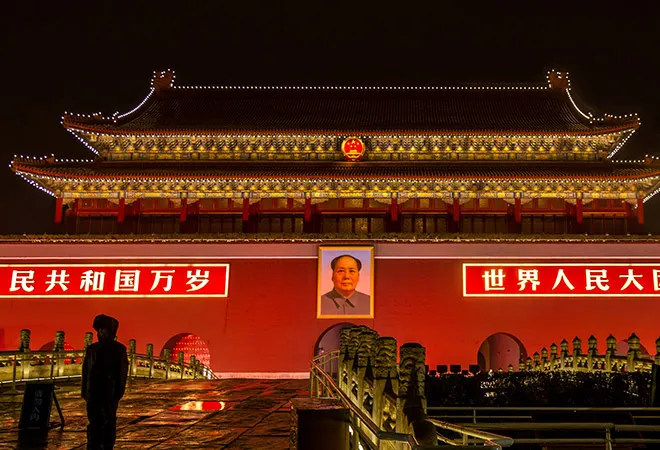-
CENTRES
Progammes & Centres
Location
The ever-increasing list of 'core interests' involving land and maritime territories indicates an open-ended expansionist drive on the part of China.

Image Source: Flickr user Hagens_world
This is the twenty eighth part in the series The China Chronicles.
Read all the articles here.
Recent events demonstrate China's emphasis on military power. China has employed its military in carefully selected areas it deems as 'core interests'. These areas include simultaneous engagement with both friendly and pressures against adversarial countries ning the land and maritime domains. The implications of these developments on regional and international security are profound.
China organised the Belt and Road Initiative (BRI) summit this year but was unable to solicit the level of support President Xi Jinping had expected. Major economic centers such as Singapore, South Korea, United States, United Kingdom, Germany and several others sent ministerial level delegations while India decided to abstain as the BRI undermines its core interests. The European Union member states that attended a trade session during the summit unanimously decided to reject the outcome statement. The reason, as already highlighted by India — the absence of assurances on transparency, co-ownership and sustainability.
With inadequate economic instruments, China started relying on its military for political signaling and coercion. The People's Liberation Army (PLA) started constructing a road in a disputed territory with Bhutan, a weaker Himalayan country. However, Bhutan wasted no time in seeking India's assistance, which pressed its military into action.
Although both the armies stand ready for possible escalation, the continued stalemate signals that China has lost its initiative while strengthening India's resolve to maintain the status-quo.
This situation only reinforced the doubts about China's "peaceful" rise and underscored the importance of military-to-military relations between India, the US and Japan.
The Malabar 2017 multilateral naval exercise took place in the Bay of Bengal, as the crisis in the Bhutan-India-China trijunction was unfolding. It involved the most potent navies of the Asia Pacific for exercises to conduct joint military operations. The depth of these exercises underscored the desire by the participants to develop a common response to emerging maritime challenges in the region.
China claims more than 80 per cent of the South China Sea (SCS) as its territory, triggering disputes with a host of countries. It has constructed artificial islands and militarised them with the intent to control maritime and air spaces and the aim of denying other countries freedom of navigation. It has established a maritime militia, an asymmetric force, for coercing other disputants, claiming natural resources and establishing new facts in critical ocean areas.
The ever-increasing list of 'core interests' involving land and maritime territories indicates an open-ended expansionist drive on the part of China. Taiwan tops this list with China claiming it as a renegade province that has to be integrated with the mainland. China has deployed its biggest naval platform, aircraft carrier Liaoning, on its maiden voyage it circled Taiwan. Recently, it was deployed to Hong Kong barely a week after Xi Jinping visited the city and presided over a military parade.
The weight and firepower of Liaoning strike group exemplifies China's emphasis on history, particularly the 'century of humiliation' that ended when the Communist Party of China (CPC) came to power in 1949. During the 'century of humiliation' China's seagoing capacity dwindled and its territorial waters were controlled by foreign navies. The British fleet transported opium to China and gained Hong Kong in the aftermath of Opium War. The arrival of Liaoning in Hong Kong is thus a political message that the CPC guards the best interests of China and ready to restore its past glory.
However, the allegiance of the PLA is not with the Chinese people but the CPC, as Xi Jinping continues to assert his power. The military's primary duty is to safeguard the party and its rule over China. Considering the Tiananmen Square protests, the warning to Hong Kong's political activists regarding the use of the military to quell any agitation against the party is very much real. Xi Jinping has not only presided over a quick succession of military demonstrations in recent years but also now anointed 'Chairman' by the military, a title reserved only for Mao Zedong.
As Xi presided over the PLA Army Day parade, Putin oversaw Russian Navy Day celebrations. China even dispatched a PLA Navy flotilla to participate in war games with the Russian Navy in the Baltic Sea. The Baltic Sea has emerged as a hotbed of military activity with Russian and North Atlantic Treaty Organisation (NATO) military assets frequently trailing each other.
The strategic significance of this sea to Russia enjoys the same significance the SCS holds for China. Therefore, the PLA naval presence and exercises in the Baltic Sea is considered a quid pro quo to Russia exercising with China's navy in the SCS.
Both Xi and Putin share a common aversion to Western values, democratic processes and rules based international order. They believe that the West is fostering military alliances and partnerships to contain their power. The emphasis on the military power is seen as a natural response to stand up against these Western pressures. Moscow's successful direct (Syria) and asymmetric (Ukraine) interventions will reinforce Russian assertiveness.
The intervention in Syria helped Russia boost its naval presence in the Mediterranean, which also included the deployment of its sole aircraft carrier. A PLA Navy flotilla also conducted live-fire drills in the Mediterranean before it sailed to the Baltic Sea. The Syrian conflict has further united China and Russia politically as they opposed United Nations Security Council (UNSC) resolutions against Syria's President Assad. This political alignment now involves Iran and Turkey.
Iran, which is facing Western sanctions against its nuclear weapons programme, supports the Assad regime and has given permission to Russia's military to use its territory for military operations. Turkey-Russia relations have soured following the shooting down of a Russian military plane but the attempted coup against Erdogan, allegedly by the Americans, restored normalcy in Russo-Turkish relations. Turkey was also interested in acquiring China's missile defence system despite Russian and NATO offers.
Both Iran and Turkey are potential members of the Shanghai Cooperation Organisation (SCO). The addition of these two states would complete the encirclement of the Eurasian landmass, the control of which is the essence of geopolitics. The British strategist Halford Mackinder and the American strategist Alfred Mahan warned insular maritime nations about the rise of a land power with the capacity to control the Eurasian landmass. Such a land power utilising vast resources at its disposal could build a superior naval fleet ultimately constraining other maritime nations.
Therefore, maritime nations have to proactively assert sea control along the coastline of Eurasia using political, economic, diplomatic and military tools. Russia's bid failed with the fall of the Soviet Union resulting in a geographically and politically demarcated Eurasian landmass. The post-Cold War power structure left the US at the helm with its military maintaining air and naval bases along the Eurasian periphery.
However, China still has the potential to dominate Eurasia if its resources are integrated into a single political organisation with advanced military capabilities. The SCO was founded by China, however, now consists of four Central Asian countries, which were once Soviet Republics. China could bring the Eurasian countries into its fold using its economic muscle through the BRI.
This geostrategic apprehension is shared by maritime nations and major rimland powers such as India and Germany regarding China's BRI. In this context, China's message is that it would not shy from relying on its military power in case the economic gains from the BRI fails, which brings to bear pressures against India, Japan and the US. History makes clear that such threats to the balance of power need to be tackled proactively.
The views expressed above belong to the author(s). ORF research and analyses now available on Telegram! Click here to access our curated content — blogs, longforms and interviews.

Vidya Sagar Reddy was a Junior Fellow in the Nuclear and Space Policy Initiative of the Observer Research Foundation, New Delhi. ...
Read More +